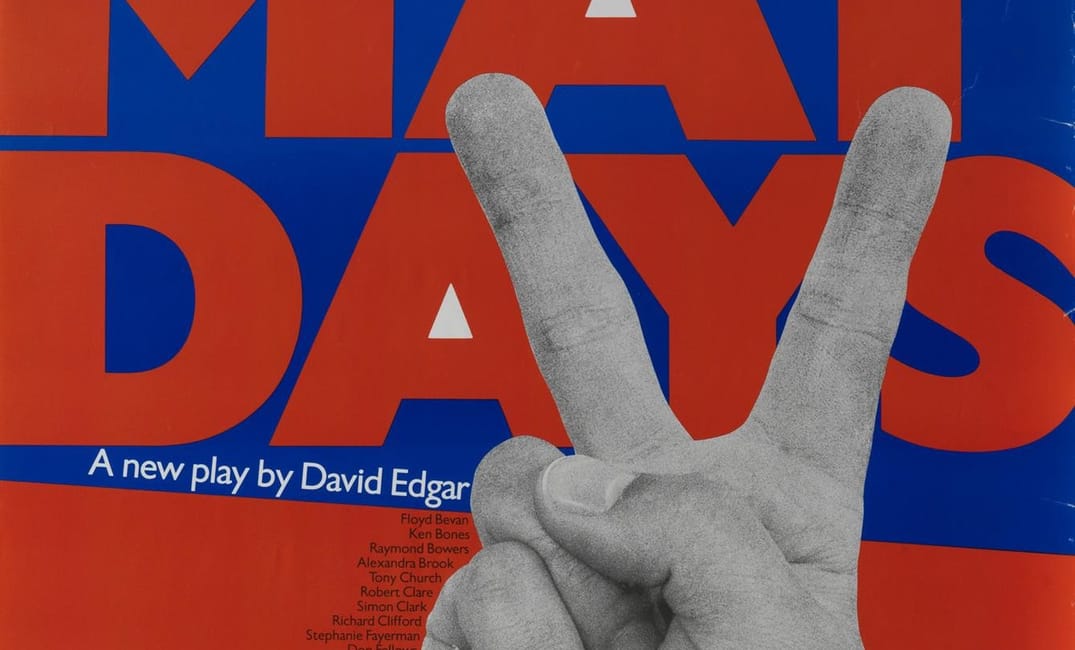John Scotting
Editor

Opening at the Royal Shakespeare Company’s (RSC) ‘The Other Place’ in Stratford-upon-Avon on 27th September, David Edgar’s Maydays is a play that tracks the rise and fall of socialism between 1945 and the early 80’s. In an exclusive interview with the play’s Director, Owen Horsley, we gain a unique insight into how the young characters lives are affected by the politics of the day and how those themes are so apposite in 2018.
David Edgar’s Maydays first opened in 1983 in the same year that Margret Thatcher’s landslide general election victory provided an endorsement for her first term by returning her to Number Ten for a second. On face value, Britain’s response to the failed Socialist experiment that preceded her programme of economic liberalisation was the outright rejection of a collectivist ideology that had rendered the country “The Sick Man of Europe”; but is that really the whole picture?
Politics is much more nuanced than the low-resolution left-right continuum portrays. The swing from pro to anti-EU sentiment, for example, didn’t happen overnight and is far from unanimous. The views of an entire population cannot be properly assessed through the lens of a simplistic binary summation. There were Trotskyites in the 80’s just as there were Libertarians in the 70s; they were just marginalised and, therefore, fade into obscurity when we think of those decades.
As trite as this is to point out, if you are under forty, the politics of today is significantly more polarised than anything you will have directly experienced before. The moderate consensus that has dominated since Thatcher’s reset brought with it a political apathy that leaves us ill-prepared for fighting these tired old battles.
Our schooling taught us that ‘history’ ended with World War Two, leaving us with a void in which the tumultuous post-war period (1945-80) is neither examined nor understood. Maydays shines a light on that void…

The play’s Scottish Director, Owen Horsley (32), is quick to point out that while it seeks to pose many questions, there is no attempt to tell you what you are supposed to think. There’s no lecturing and no agenda. What it does – which is what drew him to the play in the first place – is provide an empathetic antidote to the angry judgementalism that has poisoned today’s political discourse.
For Horsley, “Empathy is a muscle. It must be worked on”. Where the echo chambers of social media appear to be driving us in one direction, Maydays provides an insight into characters’ political experiences that could take audiences the other way.
The story begins in Britain with a boarding school boy, Martin Glass, protesting against the use of nuclear weapons. After visiting the US, gaining inspiration from the opposition to racial discrimination and the Vietnam War, he returns to meet Amanda, a single mother, and member of a small Trotskyite party, Socialist Vanguard. As he gradually adopts the politics of his middle-class parents, Amanda’s circumstances prevent her from seeing the world from the same perspective.
Meanwhile, Pavel Lermontov, a former Soviet Army officer is tried for anti-Soviet agitation and is sentenced to nine years in a gulag. On his release, he comes to Britain and sees that the Trade Union power and corporate state is leading us towards a Soviet-style society. As the story builds, both men face a fundamental choice about who they should ally with, what they believe, and where those beliefs should take them.
The fact that you are reading a political blog would suggest that such a plot is likely to resonate with you. The modern interpretation, even more so. The cast is half the size of the original, with actors adopting multiple roles that cleverly draw parallels between different lived experiences. And, by breaking the ‘fourth wall’ – in movie-speak – the actors are able to provide historical context of the narrative to those of us with no first-hand experience of the period. I can’t wait to see it!
Book your tickets today:
https://www.rsc.org.uk/mischief-festival/maydays/tickets
_

